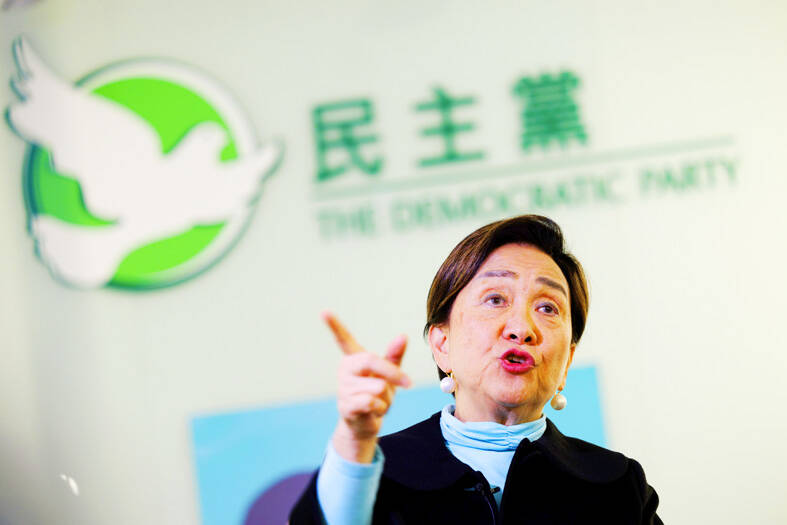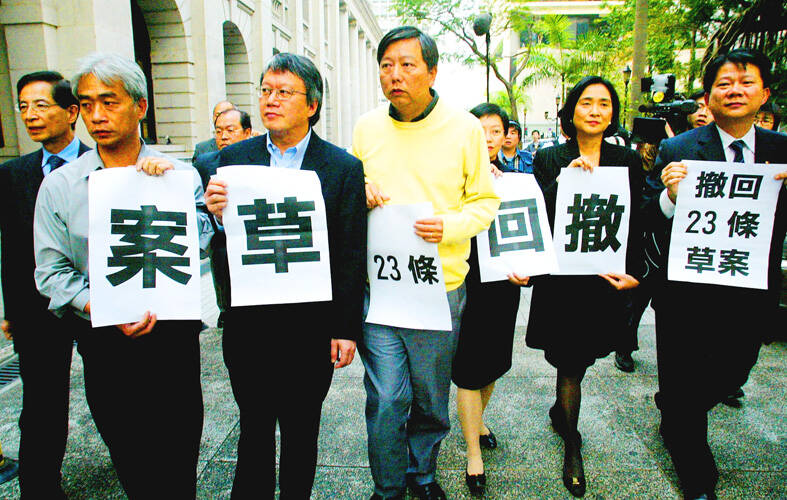Under heavy skies, the minibus carrying Hong Kong politician Emily Lau (劉慧卿) rattles along a winding mountain road to Stanley Prison for a visit she finds all too familiar.
Lau is the former chair of the Democratic Party, once the city’s stalwart opposition force, but now seatless and preparing to dissolve as some of its veterans languish in jail.
The party and its campaign for freer elections have withered under Beijing’s years-long national security crackdown. After the 2019 protests paralyzed the financial hub, Beijing moved to further restrict elections and imprison democracy campaigners.

Photo: AP
Lau listed five party comrades behind bars, including her predecessor Albert Ho (何俊仁), who could be jailed for life on national security charges.
Ho is “very, very patriotic,” she said ahead of her visit to Stanley Prison. “Look at his fate.”
The remaining members of the city’s main democracy party yesterday voted to proceed with plans to shut down, following procedures that began in February.

Photo: Reuters
At the time, party chair Lo Kin-hei (羅健熙) cited the “political environment,” but refused to say if there had been pressure from Beijing to dissolve.
Hong Kong’s Democratic Party was founded in 1994, three years before the British colony was handed over to China.
Its top concern was determining how the city would eventually elect its own leader and lawmakers through universal suffrage as promised in China’s “one country, two systems” model.
Lee Wing-tat (李永達), a founding member, was among those inspired to enter politics by Beijing’s pledge of “Hong Kong people ruling Hong Kong.”
“When I got older I found out those slogans were fake, but it’s hard to blame a young man in his twenties for being idealistic,” said Lee, who now lives in the UK.
The party’s manifesto supported the 1997 handover and acknowledged Hong Kong as part of China, a tone set by heavyweights Szeto Wah (司徒華) and Martin Lee (李柱銘).
Interviewees recalled the two leaders as yin and yang: Szeto a po-faced strategist with patriotic roots, Lee a suave barrister dubbed the city’s “father of democracy.”
The party’s moderate line meant that, for a time, it was “relatively easy” to communicate with Beijing, founding member Sin Chung-kai (單仲偕) said.
In 2010, the party decided to send three members, including Emily Lau, to meet with Beijing’s representatives in Hong Kong to discuss electoral reform.
“That was the first time and the only time that Beijing decided to negotiate with us,” Lau said.
“We said to the liaison officers, ‘Well, you must continue to talk to us,’ but they never did,” she said.
The 2010 meeting was divisive.
Critics accused the Democratic Party of selling out at a time when smaller, more radical groups were emerging in the opposition camp.
Within the party, younger members called for a more assertive stance, said Ted Hui (許智?), who won his first seat in 2011.
Hui saw a need to “break the rules of the game” in order to secure real democratic reform.
One early protest, which ended with him being tossed out of a District Council meeting, gained public sympathy, but was considered “impulsive” by party elders.
“The party needed a more comprehensive transformation, so it can move in sync with society,” he said. “We had to up our game.”
By the time the massive democracy protests seized Hong Kong in 2019, Hui and other party figures had learned to tread a fine line, playing a peaceful yet defiant role during street clashes.
The party more than doubled its seats at the District Council that year on swelling anti-government sentiment.
However, a Beijing-imposed national security law in 2020 was the beginning of the end.
Authorities used that law to jail four Democratic Party former lawmakers, saying they were among 47 opposition figures who took part in an informal primary election to subvert state power.
Hui, who moved to Australia, was also accused of breaching the security law and became the target of a police bounty.
The Democratic Party holds no elected seats after its lawmakers resigned en masse in 2020 to protest Beijing’s tightened grip.
The wipeout was repeated at District Councils the following year.
Ramon Yuen (袁海文), a former party treasurer, said members were sometimes treated like outcasts — restaurants refused to host their banquets.
“Even normal social gatherings could not be held,” he said.
Yuen said he was in favor of dissolution and expected most of the 400 party members to agree.
“Hong Kong has discussed [universal suffrage] for so many years, but regrettably we don’t know when we’ll see it,” he said.
Outside Stanley Prison, Lau said she makes regular visits to let jailed democrats know “they have not been forgotten.”
The party’s end should spur the public to ask hard questions, she added.
“Why do we have to disband? What is going on? That’s a question I want Hong Kong people to ask,” she said.

Indonesia and Malaysia have become the first countries to block Grok, the artificial intelligence (AI) chatbot developed by Elon Musk’s xAI, after authorities said it was being misused to generate sexually explicit and nonconsensual images. The moves reflect growing global concern over generative AI tools that can produce realistic images, sound and text, while existing safeguards fail to prevent their abuse. The Grok chatbot, which is accessed through Musk’s social media platform X, has been criticized for generating manipulated images, including depictions of women in bikinis or sexually explicit poses, as well as images involving children. Regulators in the two Southeast Asian

Yemen’s separatist leader has vowed to keep working for an independent state in the country’s south, in his first social media post since he disappeared earlier this month after his group briefly seized swathes of territory. Aidarous al-Zubaidi’s United Arab Emirates (UAE)-backed Southern Transitional Council (STC) forces last month captured two Yemeni provinces in an offensive that was rolled back by Saudi strikes and Riyadh’s allied forces on the ground. Al-Zubaidi then disappeared after he failed to board a flight to Riyadh for talks earlier this month, with Saudi Arabia accusing him of fleeing to Abu Dhabi, while supporters insisted he was

COMMUNIST ALIGNMENT: To Lam wants to combine party chief and state presidency roles, with the decision resting on the election of 200 new party delegates next week Communist Party of Vietnam General Secretary To Lam is seeking to combine his party role with the state presidency, officials said, in a move that would align Vietnam’s political structure more closely to China’s, where President Xi Jinping (習近平) heads the party and state. Next week about 1,600 delegates are to gather in Hanoi to commence a week-long communist party congress, held every five years to select new leaders and set policy goals for the single-party state. Lam, 68, bade for both top positions at a party meeting last month, seeking initial party approval ahead of the congress, three people briefed by

The Chinese Embassy in Manila yesterday said it has filed a diplomatic protest against a Philippine Coast Guard spokesman over a social media post that included cartoonish images of Chinese President Xi Jinping (習近平). Philippine Coast Guard spokesman Jay Tarriela and an embassy official had been trading barbs since last week over issues concerning the disputed South China Sea. The crucial waterway, which Beijing claims historic rights to despite an international ruling that its assertion has no legal basis, has been the site of repeated clashes between Chinese and Philippine vessels. Tarriela’s Facebook post on Wednesday included a photo of him giving a